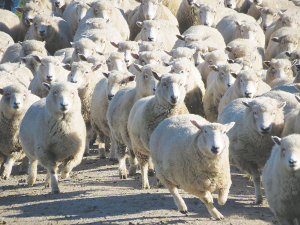Artificial breeding will play a role in accelerating the transition of a proportion of Beef + Lamb New Zealand's (B+LNZ) commercial ewe flock to a low methane emitting flock.
Work is being carried out on Lanercost, B+LNZ's first Future Farm, and is running alongside a trial to see how the low methane sheep perform on the 1,310ha North Canterbury hill country farm when compared to existing genetics.
<B+LNZ's general manager farming excellence Dan Brier says next breeding season, the management team on Lanercost will be artificially inseminating ewes to speed up the transition to a low methane flock.
The trial will look at the feasibility, or otherwise, of using artificial breeding technologies in a commercial flock.
"Lanercost will be a good testing ground for artifical breeding technologies such as artificial insemination and will hopefully give commercial farmers the confidence to invest in them if they want to change the genetic profile of their flock," Brier explains.
While the focus on Lanercost is transitioning to a low methane flock, artificial breeding could also be used to speed the genetic gain in any number of heritable traits.
“With consumer pressure increasing all the time, farmers need tools to be able to use high merit rams over a bigger proportion of their flock while keeping a lid on costs,” Brier adds. “For some farmers, it might be finer wool – while for others it could be traits like facial eczema. “
A team from Canterbury-based Xcell Breeding Services trained Lanercost’s farm manager Digby Heard to artificially inseminate 100 ewes, using semen collected from Lanercost’s existing ram flock.
In what was a “dummy run”, the selected ewes had heat synchronising CIDRs inserted 14 days before insemination took place. The ewes come into oestrous 24 to 48 hours after removal and the AI takes place 12–24 hours after that.
Ideally, ewes should be inseminated before they ovulate.
Xcell vet Angus Gibb says it is more common to insert the semen through the ewes’ belly using a laparoscope.
“This allows the use of frozen semen placed directly into the uterus and increases the conception rate to 60%–70% compared to the 50%–60% when inseminating into the ewes’ vagina.”
Gibbs says around half as much semen is used when using a laparoscope, which is another advantage of this method.
However, the advantage of vaginal insemination is that a vet is not required and staff can be trained to carry out this non-invasive procedure. There is no need to freeze the semen and one ram can be used over multiple days and multiple mobs of ewes.
“When inseminating through the vagina, the semen must be placed at the base of the cervix, which is unlike a cow,” Gibbs explains. “It does take a bit of practice to get it right, hence the trial run on Lanercost this year.”
Artificial breeding is not just used by studs – with commercial Merino farmers using the technology for some years.



















